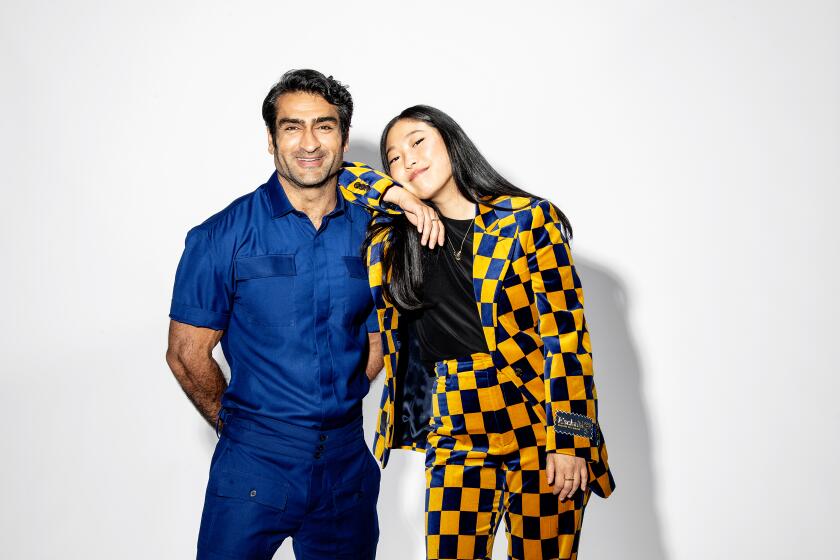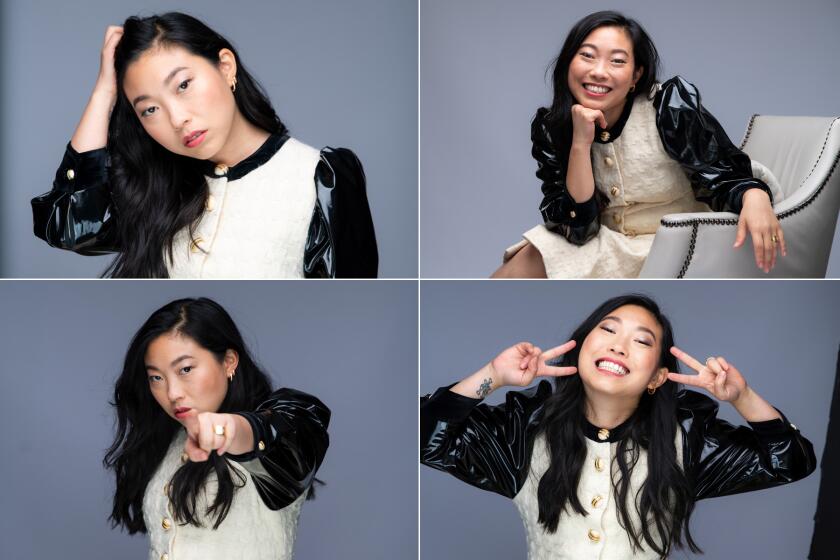Awkwafina vows to ‘always listen,’ then quits Twitter after ‘blaccent’ criticism

- Share via
After years of criticism, Awkwafina has finally responded to allegations that she used a “blaccent” and appropriated Black culture to further her career.
The “Crazy Rich Asians” and “Shang-Chi and the Legend of the Ten Rings” star released a statement Saturday vowing to “always listen” and work “tirelessly” to support marginalized communities before announcing she is taking a break from Twitter. The rapper-turned-actor has long been accused of imitating African American Vernacular English to become famous, but dropping the blaccent when it no longer benefited her.
“There is a sociopolitical context to everything, especially the historical context of the African American community in this country,” Awkwafina, whose real name is Nora Lum, wrote.
“It is a group that is disproportionately affected by institutionalized policies and law enforcement policies — all the while having historically and routinely seen their culture stolen, exploited and appropriated by the *dominant* culture for monetary gain without acknowledgment nor respect for where those roots come from, the pioneers of its beginnings and the artists that perfected and mastered the craft.”
Throughout her entertainment career, Awkwafina has worn many hats — as a comedian, recording artist, TV and movie star. Discourse surrounding her use of a blaccent picked up considerable steam in response to her breakout performance as Peik Lin Goh in the 2018 blockbuster “Crazy Rich Asians” and has followed her ever since.
When asked about the controversy during a press junket last year, Awkwafina said she was “open to the conversation” about the “multifaceted and layered” topic while promoting one of her more recent projects, Marvel’s “Shang-Chi.”
Awkwafina (“Shang-Chi and the Legend of the Ten Rings”) and Kumail Nanjiani (“The Eternals”) on shifting tides of Asian American representation in Hollywood and their fall MCU debuts.
“It is a problem we still see today — though some may pass it off as a convoluted mixture of the ‘internet TikTok slang generation’ that liberally uses AAVE, to add that hip hop — a genre of music that is ubiquitous and beloved across the country has now anchored itself as a mainstream genre in music history,” Awkwafina continued in her Saturday statement.
“And in life, linguistic acculturation, immigrant acculturation, and the inevitable passage of globalized internet slang all play a factor in the fine line between offense and pop culture.”
Ultimately though, the 33-year-old entertainer insisted and literally underlined that to “mock, belittle, or to be unkind in any way possible at the expense of others is: Simply. Not. My. Nature. It never has, and it never was.”
In Season 2 of the Comedy Central series, success is a journey, not a destination. The cast shares the real-life experiences that inspired them.
“But as a non-black POC, I stand by the fact that I will always listen and work tirelessly to understand the history and context of AAVE, what is deemed appropriate or backwards toward the progress of ANY and EVERY marginalized group,” she added.
“My immigrant background allowed me to carve an American identity off the movies and tv shows I watched, the children I went to public school with, and my undying love and respect for hip hop.”
Awkwafina, who grew up in New York City and is of Chinese and Korean descent, also reflected on her Asian American identity and mission to empower others. Amid the blaccent allegations, the A-lister has received praise in recent years for increasing Asian American representation onscreen.
Awkwafina is not herself. She’s also not her “The Farewell” writer-director, Lulu Wang.
“I think as a group, Asian Americans are still trying to figure out what the journey means for them — what is correct and where they don’t belong,” she wrote.
“And though I’m still learning and doing that personal work, I know for sure that I want to spend the rest of my career doing nothing but uplifting our communities. We do this first by failing, learning, acknowledging, hearing and empathizing ... And I will continue, tirelessly, to do just that.”
Shortly after posting her statement, Awkwafina tweeted that she will soon deactivate her Twitter account for “a few years,” per her therapist’s recommendation.
After “Crazy Rich Asians” and “The Farewell,” Comedy Central’s “Awkwafina Is Nora from Queens” is a comedown for the rising star.
“To my fans, thank you for continuing to love and support someone who wishes they could be a better person for you,” she wrote. “I apologize if I ever fell short, in anything I did. You’re in my heart always.”
Less than an hour later, she added, “To Clarify: I am retiring from the ingrown toenail that is Twitter. Not retiring from anything else, even if I wanted to, and I didn’t drunkenly hit someone with a shoehorn and now escaping as a fugitive. Also am avail on all other socials that don’t tell you to kill yourself!”
In reaction to Awkwafina’s long-awaited remarks on the matter, many social media users shared a YouTube video in which a college student named Justin explains “The Blaccent Paradox” in the entertainment industry.
“What we’re seeing ... is a hyperbolic exaggeration of Black culture that’s being used by non-Black creators,” Justin says in the video, which has amassed more than 147,000 views on the platform.
“The problem isn’t necessarily white people trying to sound like a Black person. The problem is white people trying to sound like a caricature of a Black person, a caricature that is deeply rooted in racist stereotypes.”
More to Read
The biggest entertainment stories
Get our big stories about Hollywood, film, television, music, arts, culture and more right in your inbox as soon as they publish.
You may occasionally receive promotional content from the Los Angeles Times.













